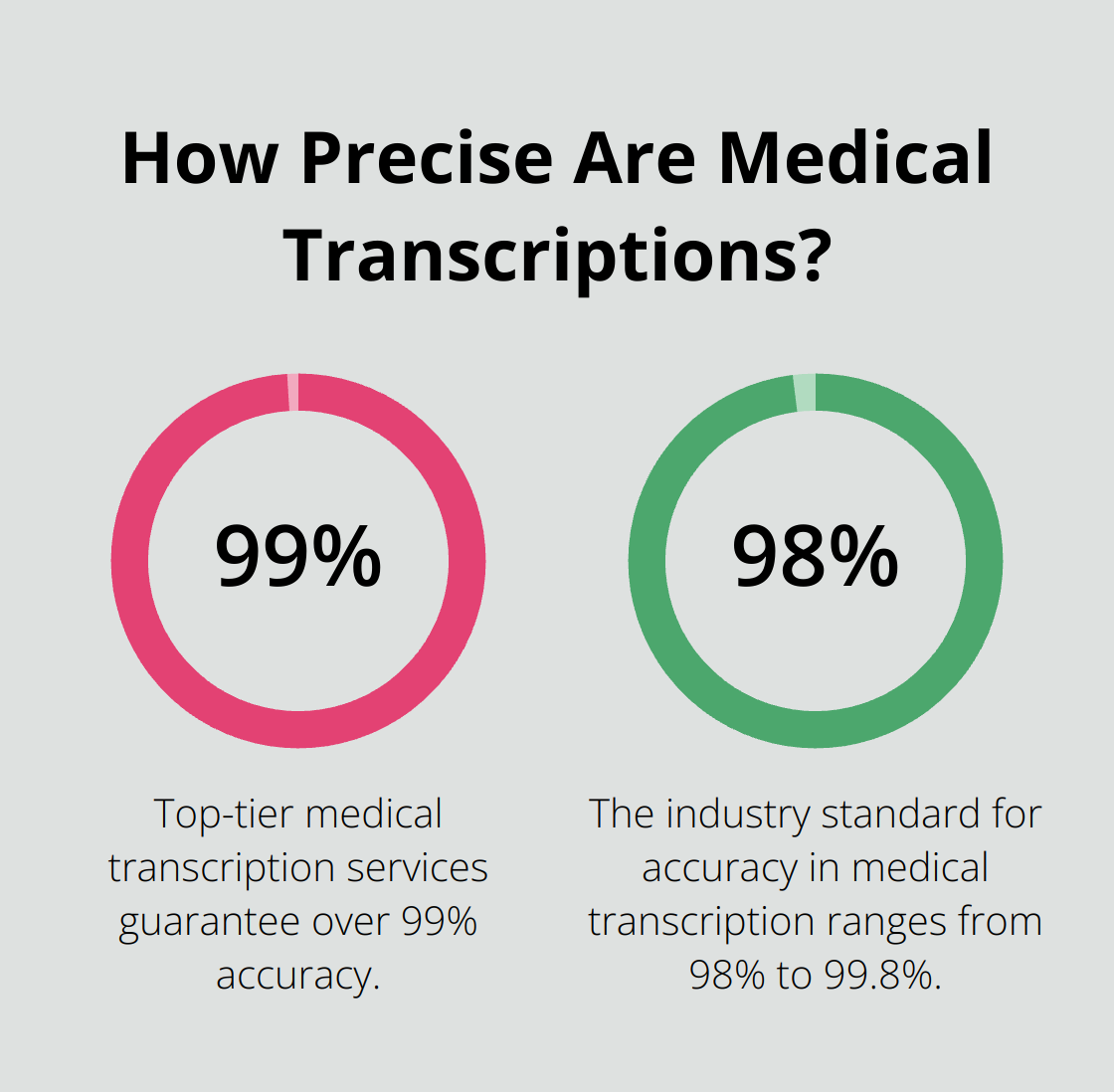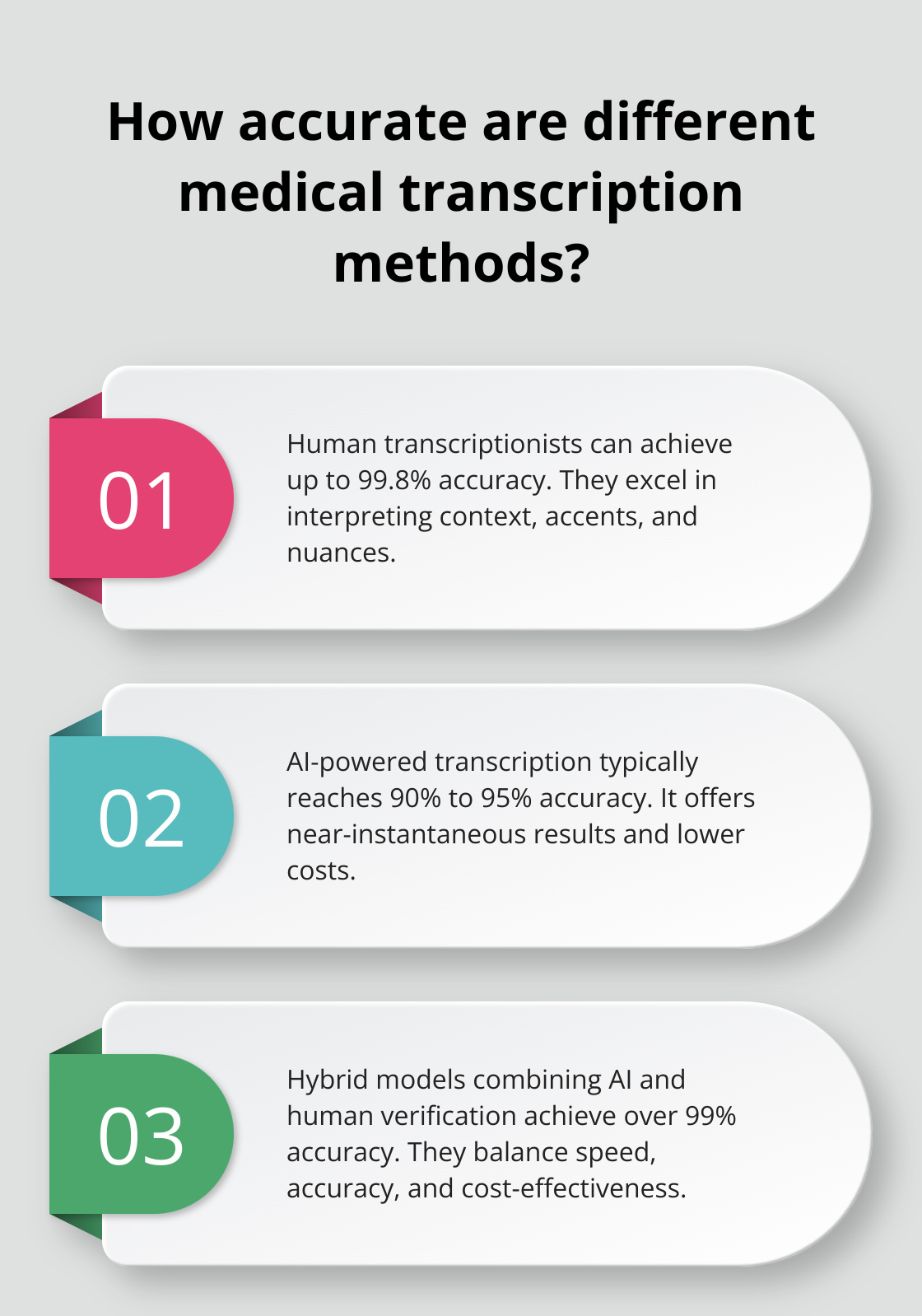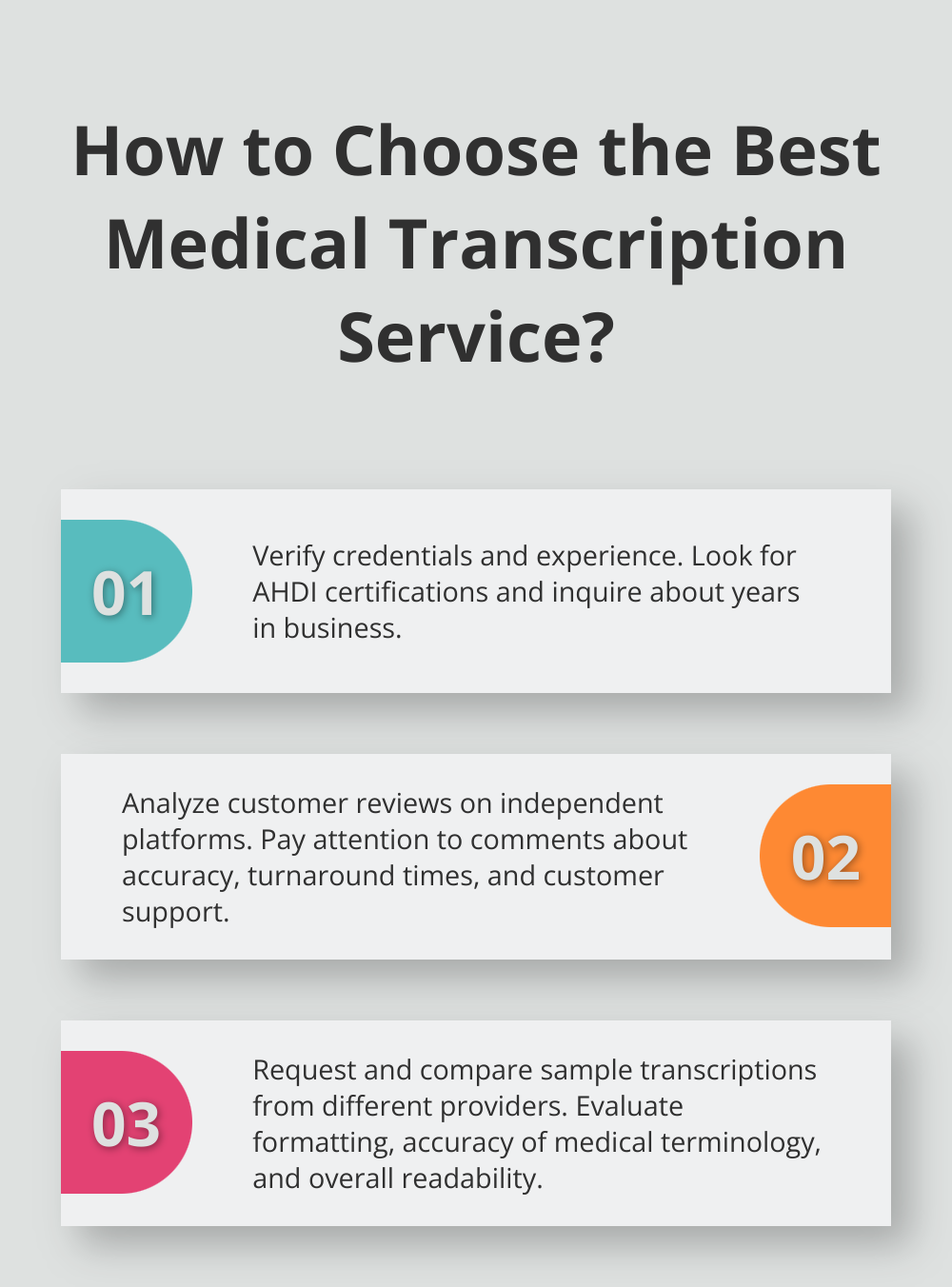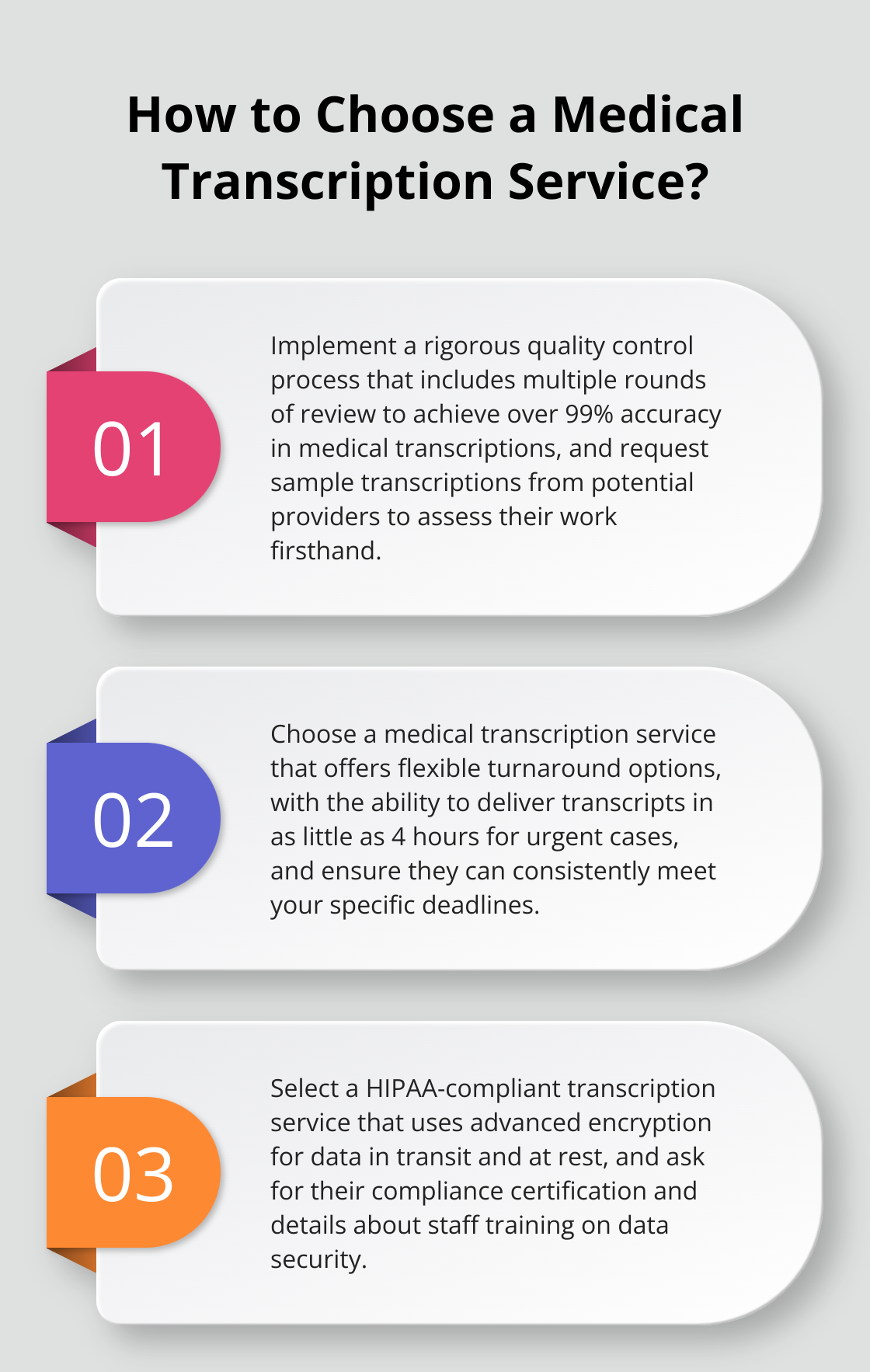Choosing the right medical transcription service provider is a critical decision for healthcare organizations. It impacts patient care, operational efficiency, and regulatory compliance.
At ScriberJoy, we understand the complexities involved in this selection process. This guide will walk you through the key factors to consider, types of services available, and how to evaluate potential providers effectively.
What Makes a Top-Tier Medical Transcription Service?
Accuracy: The Non-Negotiable Standard
Accuracy in medical transcription isn’t just important-it’s critical. A single error can lead to misdiagnosis, improper treatment, or even legal issues. Top-tier services guarantee over 99% accuracy. This level of precision results from rigorous quality assurance processes, often involving multiple rounds of review.

When you evaluate a service, ask about their error rates and quality control measures. Request sample transcriptions to assess their work firsthand. The industry standard for accuracy ranges from 98% to 99.8%, so don’t settle for less.
Turnaround Time: Speed Without Sacrificing Quality
In the fast-paced world of healthcare, waiting days for transcripts isn’t an option. The best services offer quick turnaround times without compromising on quality. While 24 hours is standard, some providers can deliver transcripts in as little as 4 hours for urgent cases.
Look for services that offer flexible turnaround options to match your needs. Ask about their average completion times and how they handle rush orders. A provider that can consistently meet your deadlines will prove invaluable to your practice.
HIPAA Compliance: Essential Security Measures
HIPAA compliance isn’t just a buzzword-it’s a legal requirement with serious consequences for violations. A HIPAA compliant medical transcription company will have proper measures in place to ensure security, health care compliance and privacy of PHI. When you outsource transcription, you entrust sensitive patient data to a third party. Make sure they take this responsibility as seriously as you do.
Look for services that use advanced encryption for data in transit and at rest. They should have clear policies on data handling, storage, and destruction. Don’t hesitate to ask for their HIPAA compliance certification and inquire about their staff training on data security.
Cost-Effectiveness: Beyond the Price Tag
While cost is a factor, it shouldn’t be the only consideration. Cheap services often cut corners on quality or security. Instead, focus on value for money. Consider the long-term benefits of accurate, timely transcripts against the potential costs of errors or delays.
Many services charge per line of transcription, with rates typically ranging from 6 to 14 cents per line. Some offer volume discounts or subscription models for regular users. Calculate the potential time and resource savings for your practice when you compare costs.
Evaluating Service Providers: A Practical Approach
To find the best medical transcription service, you need to take a practical approach. Start by checking the credentials and experience of potential providers. Read customer reviews and testimonials to get a sense of their reputation in the industry. Ditto Transcripts can help with writing accurate medical consultation reports, which can be challenging for busy medical professionals.
Also, consider the level of customer support and training offerings. A provider that offers comprehensive support and training can help you maximize the benefits of their service. Some providers (like ScribeJoy) even offer free trials, allowing you to experience their service before making a commitment.
As you move forward in your selection process, keep in mind that the right medical transcription service can significantly impact your practice’s efficiency and patient care quality. The next section will explore the different types of medical transcription services available, helping you understand which option might best suit your needs.
Types of Medical Transcription Services
Traditional Human Transcription
Human transcriptionists form the backbone of the medical transcription industry. These professionals receive training in medical terminology and can interpret context, accents, and nuances that machines often miss. A study by the American Health Information Management Association reports that well-trained human transcriptionists can achieve accuracy rates up to 99.8%.

However, human transcription has its drawbacks. It tends to be slower and more expensive than other options. Turnaround times typically range from 24 to 48 hours, which may not suit urgent cases. Costs vary widely, but high-quality human services usually charge between 7 to 20 cents per line of transcription.
AI-Powered Transcription
Artificial Intelligence (AI) has made significant advances in medical transcription. These systems use advanced speech recognition and natural language processing to convert audio to text quickly. AI transcription offers near-instantaneous results and often costs less than human transcription.
A report from Grand View Research projects the AI-powered medical transcription market to grow at a compound annual growth rate (CAGR) of 6.1% from 2022 to 2030. However, AI systems struggle with heavy accents, background noise, and complex medical terminology. Accuracy rates for AI transcription typically range from 90% to 95%, which may not meet the standards required for sensitive medical documentation.
Hybrid Models: AI + Human Verification
Hybrid models combine the speed of AI with the accuracy of human verification. In this approach, AI systems perform the initial transcription, which human professionals then review and edit. This method offers the best balance of speed, accuracy, and cost-effectiveness.
ScribeJoy uses this hybrid approach, achieving over 99% accuracy while maintaining competitive pricing. The combination of AI speed and human expertise allows for faster turnaround times (often within hours rather than days) without sacrificing quality.
Specialty-Specific Transcription Services
Some transcription services specialize in specific medical fields, such as radiology, pathology, or psychiatry. These providers have in-depth knowledge of the terminology and documentation requirements unique to these specialties.
While specialty-specific transcription services may offer benefits, it’s important to note that medical practices face various challenges. For instance, a recent MGMA Stat poll found that medical group practices have largely kept their patient no-show rates in check throughout 2023. This highlights the importance of efficient practice management, which can include effective transcription services.
The choice of medical transcription service depends on your practice’s specific needs, transcription volume, budget, and required turnaround times. Each service type has its strengths, and the right choice will align with your unique circumstances. The next section will guide you through the process of evaluating potential medical transcription service providers to help you make an informed decision.
How to Evaluate Medical Transcription Service Providers
Verify Credentials and Experience
Start your evaluation process by examining the provider’s credentials. Look for certifications from recognized bodies such as the Association for Healthcare Documentation Integrity (AHDI). These certifications indicate a commitment to industry standards and ongoing professional development.

Experience plays a significant role in medical transcription. A provider with a long track record has likely encountered and overcome various challenges. Ask about their years in business and their experience in your specific medical field. For example, if you practice internal medicine, you’ll want a service familiar with internal medicine terminology and report structures.
Scrutinize Customer Reviews and Testimonials
Customer feedback offers valuable insights into a provider’s performance. Find reviews on independent platforms like Google Business or industry-specific forums. Pay attention to comments about accuracy, turnaround times, and customer support.
Don’t limit your focus to star ratings. Read the detailed reviews to understand the specific strengths and weaknesses of each provider. If you notice recurring complaints about a particular issue, consider it a red flag.
Request and Analyze Sample Transcriptions
Never commit to a service without seeing their work. Request sample transcriptions relevant to your specialty. When reviewing these samples, pay attention to formatting, accuracy of medical terminology, and overall readability.
Compare samples from different providers side by side. This comparison will help you identify subtle differences in quality that might not be apparent when viewed in isolation.
Assess Support and Training Offerings
The level of support and training a provider offers can significantly impact your experience. Inquire about their customer support hours and response times. Round-the-clock support can prove invaluable for practices with irregular hours.
Training holds equal importance. A provider should offer comprehensive training on their platform and processes. This training ensures you can maximize the benefits of their service from the start.
Evaluate the provider’s willingness to customize their service to your needs. Can they adapt their templates to match your preferred format? Do they welcome feedback and continuous improvement?
Consider Customization and Scalability
Your chosen medical transcription service should adapt to your unique needs and grow with your practice. Ask about customization options for report templates, turnaround times, and delivery methods. A flexible provider (such as ScribeJoy) can tailor their service to fit your workflow seamlessly.
Scalability is another key factor. As your practice expands, your transcription needs may change. Choose a provider that can handle increased volume without compromising quality or speed. This foresight will save you the hassle of switching providers down the line.
Final Thoughts
Selecting the right medical transcription service provider requires careful consideration of accuracy, turnaround time, HIPAA compliance, and cost-effectiveness. The diverse landscape of medical transcription services includes traditional human transcription, AI-powered solutions, and hybrid models. Each type offers unique strengths, and the ideal choice depends on your practice’s specific requirements.

Thorough evaluation of potential providers through credential checks, customer reviews, sample analyses, and support assessments leads to an informed decision. This decision can enhance your practice’s efficiency and patient care quality. Medical transcription service providers (like ScribeJoy) offer customizable templates, HIPAA compliance, and round-the-clock support to ensure seamless integration with your workflow.
We invite you to experience the benefits of a top-tier medical transcription service firsthand. ScribeJoy offers a three-day risk-free trial, allowing you to see how our service can streamline your documentation process. Choosing the right provider improves your documentation and invests in the overall quality and efficiency of your healthcare practice.

Leave a Reply
You must be logged in to post a comment.